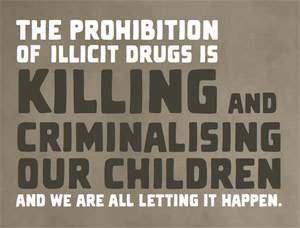George Will has a particularly stupid column in the Washington Post: The drug legalization dilemma with recycled talking points from the likes of Mark Kleiman.
There are a whole lot of flaws in his arguments – here’s the main one:
So, suppose cocaine or heroin were legalized and marketed as cigarettes and alcohol are. And suppose the level of addiction were to replicate the 7 percent of adults suffering from alcohol abuse or dependency. That would be a public health disaster. As the late James Q. Wilson said, nicotine shortens life, cocaine debases it.
Still, because the costs of prohibition — interdiction, mass incarceration, etc. — are staggeringly high, some people say, “Let’s just try legalization for a while.†Society is not, however, like a controlled laboratory; in society, experiments that produce disappointing or unexpected results cannot be tidily reversed.
Note first that under the Will/Kleiman world-view, all drugs – from marijuana to heroin – will be accepted and marketed in the same identical way that alcohol is under a legal regime. They can’t even imagine different models happening in society. And so we must suffer for their lack of imagination.
Then, of course, in their world-view each new drug will result in a new abuse-population segment equivalent size to that of alcohol abuse with no overlap. Logically, then, if we legalized 20 new drugs, 147 percent of the population would then be suffering from abuse and dependency.
Of course, that’s absolute rubbish.
The truth is that abuse and dependency are driven by a lot of factors and are not specifically tied to the availability of drugs. There is a certain portion of the population that is more likely to abuse drugs, and they will likely abuse drugs regardless of their availability. Changes in that portion have more to do with social structure and than drug policy. This has been proven in world-wide models.
Legalizing a drug doesn’t mean that you have a new population of abusers. Instead, some who now abuse alcohol will switch to the other drug. Some will combine. Some will abuse the new legalized drug who abused it when it was illegal.
The largest increase in number of users of that drug will come from the casual non-problematic use. Criminalization is much more likely to deter non-problematic use than it is to deter abuse.
And that final point about society being messy, so we can’t just try legalization for awhile because we might not be able to reverse it… how convenient. And fucking offensive.
Imagine that argument being used for other social changes… “Oh, yeah, negroes have it rough, but we can’t really take a chance on freeing the slaves, because what if it turns out to be socially disruptive to me and my white friends? We’d never have the political will to reverse the decision. They should just continue being slaves and accept that as being part of the price of our free society.”
There are other points of stupidity and dishonesty in Will’s OpEd, such as his discussion about tobacco.
Another legal drug, nicotine, kills more people than do alcohol and all illegal drugs — combined. For decades, government has aggressively publicized the health risks of smoking and made it unfashionable, stigmatized, expensive and inconvenient. Yet 20 percent of every rising American generation becomes addicted to nicotine.
Note that he uses tobacco to show health risks, and yet conveniently fails to mention that American society has dramatically reduced alcohol use and abuse without criminalization.
Or:
Furthermore, legalization would mean drugs of reliable quality would be conveniently available from clean stores for customers not risking the stigma of breaking the law in furtive transactions with unsavory people. So there is no reason to think today’s levels of addiction are anywhere near the levels that would be reached under legalization.
Why would clean drugs of safe dosage in controlled setting result in higher levels of addiction? Will doesn’t say. He once again implies that availability=addiction, something that is demonstrably untrue.
Throughout, he conflates alcohol, marijuana, and cocaine (and other drugs), even though all three drugs are dramatically different in terms of their effects
And finally, the specter of public health disaster from an unknown supposedly massive group of people just waiting to become addicts at the drop of a legal drug in George Will’s fantasy world still isn’t justification for the worldwide disaster that is the war on drugs.

 An excellent new report from Australia 21 Roundtable:
An excellent new report from Australia 21 Roundtable: 